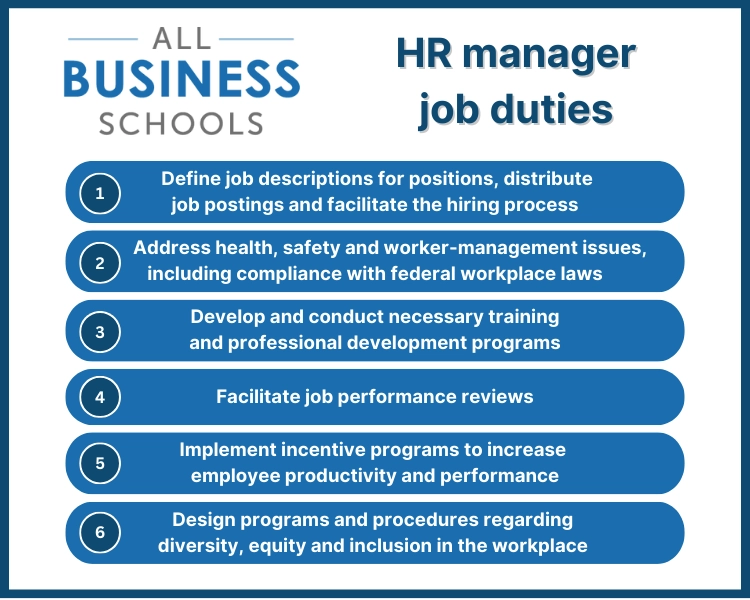In this Article
Human resources education and career guide
What Does HR Do? (Roles & Responsibilities)

A Human Resources (HR) job entails overseeing various aspects of the employment process, including recruitment, onboarding, and training of new staff members. HR professionals also play a crucial role in managing payroll and ensuring timely and accurate compensation for employees.
The primary role of an HR manager is to hire the right people, put them in the right roles, and give them the training, compensation and workplace support to succeed.
Human Resources job description: What are the duties of HR?
Human resources managers typically work as generalists overseeing multiple areas, although in large organizations they may be specialists overseeing a team of other HR specialists. No matter how a business is organized, common responsibilities of HR managers include:

Qualities and traits of a successful HR Manager
An effective human resources manager can connect with people at all levels of an organization. As you consider this career, here are some skills and traits that help HR professionals succeed.
Communication skills
Managers must be comfortable communicating with stakeholders on the employee and employer sides of an organization. "Students, graduates, new professionals and seasoned ones alike, will all need constant practice and improvement with communications," said Rue Dooley, SHRM-SCP, HR Knowledge Advisor with the Society for Human Resource Management (SHRM). "The ability to communicate well cannot be understated or undervalued in the profession of human resources."
Empathy and compassion
HR managers support workers during challenges that occur at work and outside of work. This requires creating an environment in which all employees feel comfortable communicating problems and concerns. Having the ability to respond to an employee's emotions can help build and sustain positive workplace relationships and make the employees feel more connected to an organization.
Relationship management skills
Communicating effectively and managing your interactions with others are crucial skills. "Relationship management consists of the ability to contribute to conflict resolution and to conduct formal and informal training," said Dooley.
Commitment to continuing education
An HR manager must stay on top of their profession because human resources is a dynamic and ever-changing field. "New laws, frequent changes, shifts in workplace landscapes, and more all conspire to force human resource professionals like no other professional to make quick adaptations based on shifts in legislation and other dynamics," said Dooley. "After college, a human resource professional will want to stay abreast of current events. There is simply no way around that."
HR job roles & duties: Common job titles in Human Resources
Human resources managers serve as a link between employees and employers. They touch every aspect of an organization since it would be impossible for an organization to exist without the people who work within it.
HR roles include a broad range of specialist and generalist positions. Responsibilities vary significantly across industries and employers, but three common HR manager titles are:
Human resources managers serve as a link between employees and employers. They touch every aspect of an organization since it would be impossible for an organization to exist without the people who work within it.
Entry-level HR roles & responsibilities
A bachelor's degree is typically required for HR management positions. However, it's possible to qualify for entry-level positions with an HR associate degree and advance with more education and experience. Typical starting positions include:
Human Resources Clerk
They handle administrative tasks such as maintaining personnel records, placing job ads and assisting in onboarding new hires.
Benefits Coordinator
These coordinators perform administrative tasks that involve sick days, vacation time and insurance and retirement plans.
Payroll Clerk
These clerks collect and calculate data to help make sure employees are paid accurately and on schedule.
Recruiter
A recruiter handles the day-to-day duties associated with attracting job candidates, although entry-level recruiters don't make hiring decisions.
Managerial roles in HR
Qualifications for a human resources manager typically include a bachelor's degree and about three years of professional HR experience. Common titles include:
Employee Relations Managers
These managers handle issues that arise between an organization's workforce and management. Their responsibilities can involve consulting on new and existing policies, negotiating worker contracts and complying with workplace regulations.
Compensation and Benefits Managers
These HR workers evaluate jobs and develop salary structures as well as benefit plans. Their work can involve labor laws and regulations that protect the health and welfare of employees.
HR Information Systems Managers
These workers oversee systems that record employee data such as wages, vacations and working hours. They supervise the daily operations of HR information systems and produce data reports.
Training and Development Managers
Training and development managers work to improve the productivity of an organization's workforce. They research, design and implement training programs to accomplish the goals of the organization.
Labor Relations Managers
They negotiate contracts and agreements between labor groups or individual employees and the organization. They may play key roles in labor disputes and other situations that might interfere with the organization's success.
Executive-level HR roles
HR managers in leadership positions occupy roles at the top of an organizational chart and tend to earn higher salaries. They're more involved with business and policymaking than with program administration that's handled at the department level.
While an advanced degree may not be necessary for all top roles, it can help you stay competitive. As more HR professionals earn master's degrees, college graduates will find themselves competing with job candidates who have advanced degrees, according to Dooley.
HR managers at the highest levels are likely to have one of the following positions:
Chief Diversity Officer
The chief diversity officer is responsible for organizational planning, strategy and guidance to ensure their business maintains diversity and equality among job candidates and employees. They oversee and analyze current practices and design initiatives to promote change to meet the organization's goals.
Director of Human Resources
A director of human resources serves as a department or division head, positioned at the lowest level of the executive team. In coordinating operations with the vice president or other senior executives, the director focuses on the bigger picture and ensures that the daily operation of the human resources department meets established standards and objectives.
VP of Human Resources
This executive leads and directs all aspects of HR management. As a member of the executive team, they establish short- and long-range organizational goals and operating procedures, evaluate their effectiveness and lead improvement.
HR managers support workers during challenges that occur at work and outside of work. This requires creating an environment in which all employees feel comfortable communicating problems and concerns.
Where do Human Resource Managers work?
HR Managers can work in any setting where employees must be managed, so they can be found in nearly all workplaces. However, the roles and responsibilities of HR managers vary significantly based on where they work.
Private companies
Most HR managers work in private companies in industries ranging from technical services to manufacturing. While smaller companies may have one HR manager who oversees all staff and work, larger organizations may employ several managers who each oversee a specific area within the department.
Depending on the size and type of company, HR managers may have to travel to maintain employee relationships across an organization and to recruit job candidates.
Government
Human resources managers work at all levels of government, including local, state and federal agencies. Most government HR managers have the same goals and responsibilities as those in private industry, though working for an agency requires knowledge of processes used by the government for hiring and staffing.
Non-profit organizations
Depending on the size and role of a nonprofit, a human resources manager may have other roles in addition to overseeing employees. This can include managing volunteers as well. Since smaller nonprofit organizations operate with minimal staff, an HR manager may report directly to a board member instead of an HR executive.
Consulting firms
HR managers who work at consulting firms are hired by organizations to do work that a company may not have the HR staff to perform, such as training and development, or compensation and benefits analysis. They also may make recommendations to improve HR policies.


